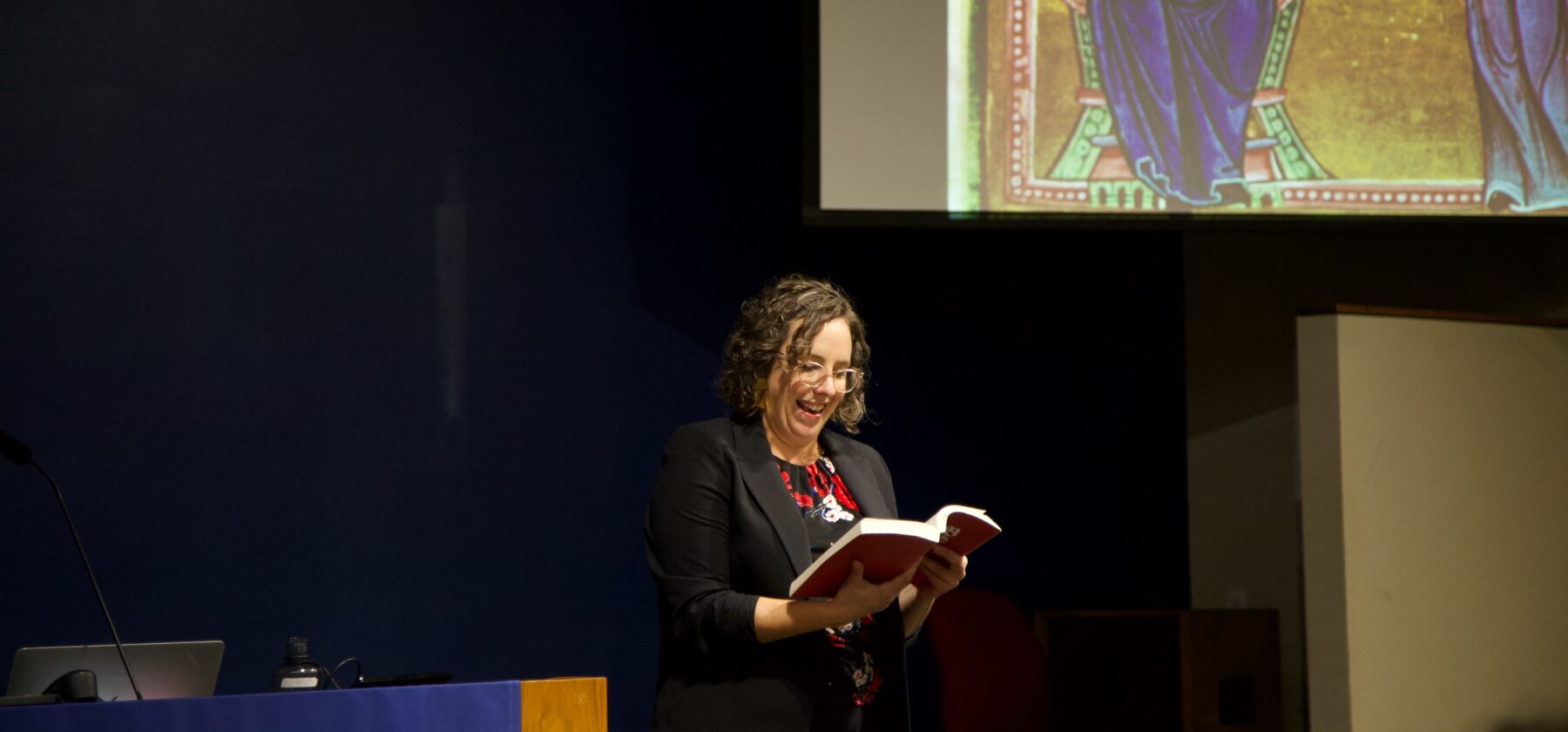Slow Faith in a Fast World: Lauren Whitnah on the Benedictine Rule and Listening Well
In our modern world we are inundated with thoughts and opinions, which come at us in a never-ending stream of content. We are constantly talking and forming opinions, always chasing the newest idea or thing. Lauren Whitnah—a medieval historian and current dean of Nashota House Seminary—spoke at a Center for Faith and Inquiry (CFI) event on October 3 about a historical Christian approach to a slower way of life, keeping in step with CFI’s annual theme, “Ready to Listen, Learning to Talk.” Using the Benedictine Rule as an example for what a traditional life of faith could look like, she demonstrated that listening well is the key to a more intentional faith, both personally and communally.
What Is a Benedictine Rule?
Crafted by Saint Benedict of Nursia (490-547 AD), St. Benedict’s Rule is a traditional medieval Regula, written to be practiced in monasteries. The Rule is not a list of laws, but an outline of suggested practices centered around the intention of living a God-honoring life. Because it was intended for use by monks, the Rule included a schedule for prayer, expectations about monastic leadership and other practical matters. As a “straight-edge” for Christian life, the Rule’s primary focus was to connect abstract beliefs and virtues to a rhythm of practice for everyday life.
Listening Well as the Foundation of Godly Living
Whitnah pointed to how the Rule paid attention to the wisdom of the past to inform current faith practices, an approach she recommended we practice in our lives today. “If we acquire some facility in treating the past with a hermeneutic of generosity and of justice, that can help us interact with our neighbors now; listening to people who are long-dead may help us listen now,” Whitnah said.
In a nod to CFI’s “Ready to Listen, Learning to Talk” theme, Whitnah addressed the medieval spirituality of Benedict’s Rule and its focus on how to be a good listener. The Rule begins, in fact, with the word, “Listen.” Whitnah said this is the first thing one can learn from the Rule—to pay attention.
However, according to St. Benedict’s Rule, we must use discernment as we listen. The modern reader is bombarded every day with information and opinions that they must sift through. Benedict’s Rule emphasizes listening in the context of Scripture (upon which the Rule is based) and the wisdom of other mature Christians. Following a rule founded on listening to the Scriptures is the beginning of a holy life.
Listening Skills at Work
Whitnah drew out more practices from the Rule of St. Benedict that come after the initial step of listening well. One of the most important is prayer in daily life, which is highlighted by a direct quote from the Rule: “To pray is to work, and to work is to pray.” This principle means that we need to reorder our priorities. We often try to fit in prayer––our communication with God himself––around the other work in our life, when God should be first.
Whitnah also addressed the orderliness the Rule recommends for communal life. This order is reflected in monastic job assignments; each person had a different job and was expected to do it with excellence. The hierarchy and governance of monasteries was a way of ordering life to keep the community together.
While most of our communities today are not run by an abbot, we can still emulate the principle of an orderly community by fulfilling our God-given roles and building clear, healthy structures of governance. An orderly community and an orderly life, Whitnah suggested, remove chaos and disorder from our lives, which allows more time for listening.
Listen to Others
Whitnah concluded by describing a mosaic in a Benedictine church that depicts a row of female saints down one wall of the church and male saints on the other. When you enter, she says, “You are quite literally in the communion of saints.” According to the Benedictine Rule, a life of listening to Scripture, tradition and the wisdom of believers past and present, especially those around us, is not an independent walk but a communal one. We can’t listen to others if we’re only relying on our own thoughts and opinions.
In the spirit of the Rule, the Christian life is one of moderation. Adapting spiritual practices to the modern world is something that can be done in community, living with the heart of the Rule in mind. Whitnah concluded by saying, “You don’t have to figure it all out on your own. So listen. Do the work. Build some order. Lead well. And remember that you’re in good company . . .We start where we are, and try bit by bit to keep going.”
Emily Jones ’24, English language and literature
 The Bell
The Bell